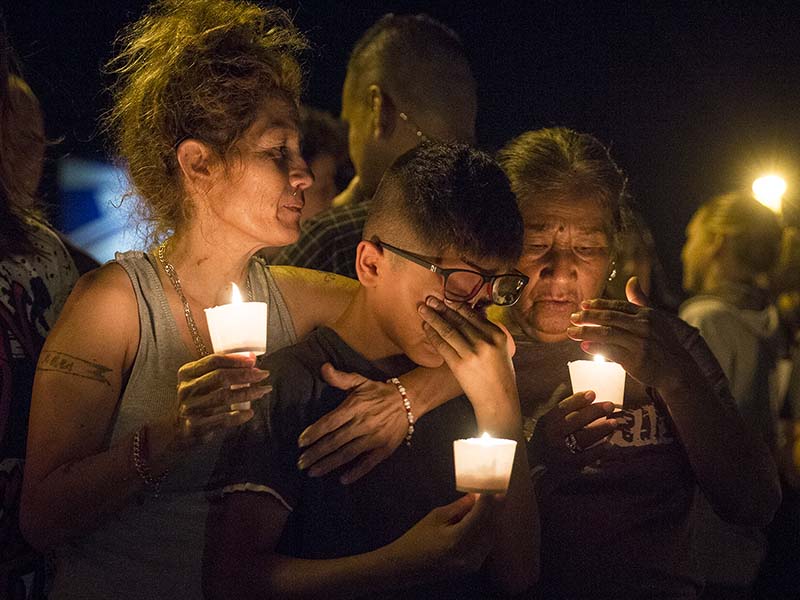We Jews use a certain phrase to speak of our hopes and of our destiny.
L’dor va-dor — “from generation to generation.”
I have been thinking about l’dor va-dor in connections with the church shooting in Sutherland Springs, Texas.
One minute the Holcombes were a tight-knit family praying in the tiny church on Fourth Street.
The next, eight of them were gone.
Bryan and Karla Holcombe, a guest preacher and his wife, were dead.
Their son Marc Daniel Holcombe, gone. Their pregnant daughter-in-law, Crystal Holcombe, gone.
And four of their grandchildren — Noah, Emily, Megan and Greg — gone.
The gunman nearly wiped out the Holcombe family, leaving Joe Holcombe, 86, Bryan’s father, to mourn the loss of the generations he had raised. “We know where they are now,” he said in an interview, his voice strained by exhaustion. “All of our family members, they’re all Christian. And it won’t be long until we’re with them.”
For the last few days, I have been wondering aloud: what will next Sunday be like in that tiny church in that tiny Texas town? How can those parishioners have anything resembling faith?
The short answer: it’s about heaven.
And yes, Judaism believes in heaven — olam ha-ba, the world to come.
Why don’t more Jews know that?
True — that idea is not really in the Bible. The Bible says that when you die, you go to a dark, boring place called Sheol.
But, in post-biblical literature and theology, we get a full-blown sense that this life is not the final word. It’s called olam ha-ba, the world to come.
When I tell Jews about olam ha-ba, the world to come, they say to me: “That sounds awfully Christian to me.”
To which I respond: “Where do you think they got the idea?”
It was where Islam got the idea as well (and radical Islam has shown us how dangerous the over-emphasis on the next world can truly be).
It is a vision that exists in some form in Western religion: that the soul — that piece of us which is unquantifiable, the place where our values reside, the place of our personhood – endures forever in heaven, or the olam ha-ba, the world to come, or Gan Eden, the supernal Garden of Eden.
When I perform a funeral, I recite this prayer: “El Male Rachamim, God of Compassion, let the soul of our beloved rest beneath the wings of God’s Presence, along with all the other pure and righteous ones in the Garden of Eden.”
Many of you are now saying: “Wait a minute. This is not the Judaism I grew up with. The Judaism that I grew up with is a Judaism that is only about life, about doing good, about ethics, about using the mitzvot to repair the world.”
It is a Judaism that echoes the ancient sage: “Better is one hour of good deeds and repentance in this world than the entire life of the world to come.”
But, it’s not either/or; it’s both/and. It’s about this world — and also about the next world.
Even if it comes (forgive me) as an afterthought. And even, and especially, if we don’t “know” what happens after death.
Somewhere along the line, we modern Jews lost the idea of the World to Come. It was too mystical, too superstitious, insufficiently scientific.
But, then I go back to thinking about Joe Holcombe, age 86, mourning the loss of two generations — two generations! — of his family. I think about his certainty that he knows “where they are now.”
I am not advocating that we Jews abandon our commitment to this world, and to making it better.
Especially because the most pressing project that we have before us in this country, is to radically reduce the number of family members who will have to rhapsodize about “where they are now” as the result of miscreants who can get their hands on high-powered guns.
I am saying that we Jews could profit from examples of faith — faith that this world is not the end. For whether or not this idea is “true,” in a scientific sense (and I remain agnostic about whether the dead will be resurrected at the end of human history, as part of the messianic process), it is true in a deep, spiritual sense.
You might not believe this now, as you read this essay.
But, trust me: when your loved one dies, and you are sitting in a funeral home or standing by the graveside, you will want to believe that this world is not the end, that what we are and who we are does not simply crumble into the dust.
In whatever form your faith takes shape, may it strengthen you, and sustain you.
And, please God, may it strengthen and sustain the good people of Sutherland Springs, Texas.






